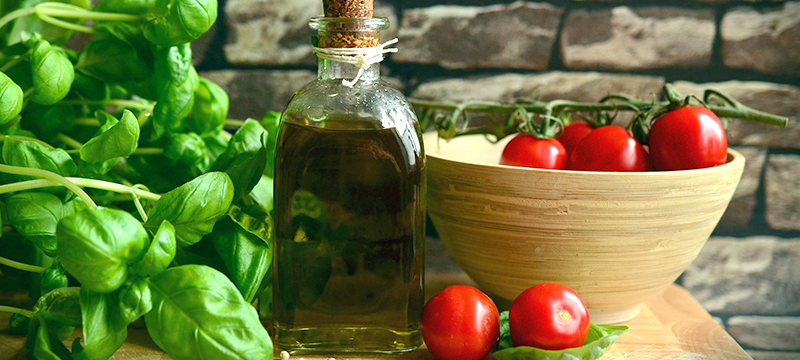
It is commonly known that the food we eat greatly reflects on our good health and longevity. The Mediterranean diet, which includes the traditional Dalmatian cuisine, has proved to be the healthiest diet in Europe because – unlike a typical Western diet which contains a lot of saturated fats, sugars and refined grains – it is rich with fish, legumes, fruits and vegetables, and lots of monosaccharides such as olive oil. At the same time, it promotes a moderate to low intake of dairy and meat products. The benefits of the Mediterranean diet based on fish, fresh fruits and vegetables and a glass of wine a day are scientifically proven.
In Pašike restaurant, as one of the typical representatives of healthy, traditional, indigenous Dalmatian cuisine, we bring you a few healthy, Dalmatian ingredients that make up the base of Dalmatian cuisine.
1. Olive oil
Olive oil is the jewel in the crown of the Mediterranean diet, and Dalmatian cuisine as such. Its production continues to increase, it is widely appreciated, it takes the place it deserves in Croatian gastronomy and is used in a variety of dishes. It is added to cooked dishes like some noble spice, it is used for frying, as a seasoning for vegetables and salads. It’s also becoming a more common ingredient in deserts. It is very healthy and it is a most desirable type of fat in human diet as it contains plenty of saturated fats, antioxidants, omega-3 and omega-6 fatty acids and oleic acid considered to be responsible for lowering blood cholesterol, as well as blood pressure.
Dalmatian cuisine is unimaginable without olive oil.
2. Fish and seafood
Grilled or boiled fish, as well as seafood such as shells and crabs, are highly appreciated in the gastronomic world. There are many recipes for their preparation in Dalmatian cuisine. Not only are they exceptionally tasty, but everything from the sea is incredibly healthy, full of minerals, vitamins and healthy fatty acids. The fish also contains proteins, magnesium, iodine, selenium and phosphorus, vitamins from the D and B group which contribute to increased energy, healthier metabolism and better concentration.
Also, omega-3 fatty acids, found in abundance in fatty fish, are important to the body. Dalmatian people, as opposed to continental people, do not have to take them in the form of dietary supplements since the fatty fish is available to them almost all year long, with the exception of shorter hunting-free periods, at very low, affordable prices.
3. Garlic
Garlic or white onion (lat. allumsativum) is a plant of very strong and long-lasting flavour, which is known for its excellent culinary and medicinal properties. The main ingredient of garlic is allicin which possesses amazing antibacterial, antiviral, antifungal, antiparasitic and antioxidant effects. Studies confirm that regular garlic use regulates blood pressure and cholesterol and blood sugar levels. Studies also confirm that garlic can serve as an excellent prevention for many types of cancer.
Garlic, especially in combination with parsley, is widely used in Dalmatian cuisine and is an indispensable ingredient in many dishes. It is most often added to baked or fried fish, cooked vegetables and various meat or vegetable sauces.
4. Parsley
Parsley (lat. Petroselinum crispum) is a biennial plant from the apiaceae family. It (the root and leaves) is used to compliment dishes, especially soups, for food decoration and for additional flavour. Parsley root with leaves can be stored in sand during the winter, and the root can stay in the ground as it is resilient. The leaves are richer in vitamin C than the root itself, and they contain B group vitamins, minerals and iron. Parsley is a real treasury of medicinal substances. In Dalmatia, the names petersimul, petrušimul and petrusin are more frequently used, and they actually stem from the Venetian word “petersemolo”. Venetian word “petersemolo”.
Parsley is so widespread in Dalmatian cuisine that it is almost impossible to list dishes that Dalmatian housewives do not put it in.
5. Tomato
Tomato (lat. Solanum lycopersicum) is an annual vegetable plant, a close relative of potatoes because it belongs to the nightshade family (solanaceae) of plants. It has many names in the Croatian language such as pomidor, paradajz, paradižnik, zlatna jabuka, tomat, jabučica. The tomato is traditionally classified as a vegetable, but from the perspective of a botanist, it is considered to be a fruit.
It can be eaten raw, dried and boiled, prepared in countless ways, it perfectly complements meat, fish and other vegetables. It is the main ingredient of the ever-popular Dalmatian šalša – tomato-based sauce, which serves as the foundation for other sauces that you can add fish, shells, crustaceans and tuna to, and create amazing culinary combinations.
In our restaurant Pašike, all of these ingredients make up the basis of the indigenous Dalmatian cuisine we firmly stick to!